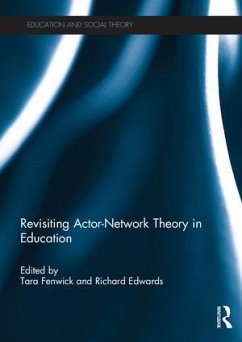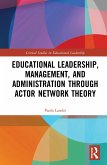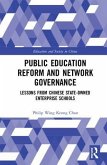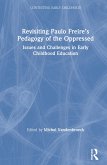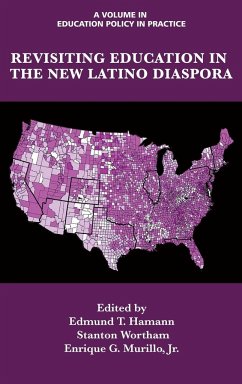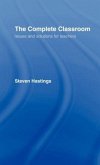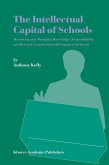Revisiting Actor-Network Theory in Education
Herausgeber: Fenwick, Tara; Edwards, Richard
Revisiting Actor-Network Theory in Education
Herausgeber: Fenwick, Tara; Edwards, Richard
- Gebundenes Buch
- Merkliste
- Auf die Merkliste
- Bewerten Bewerten
- Teilen
- Produkt teilen
- Produkterinnerung
- Produkterinnerung
Actor-network theory (ANT) is enjoying a surge of interest in educational research, as educators bring unique sensibilities and commitments to debates that characterise ANT-inspired research. This volume contains papers that address educational issues while showing creative theoretical and methodological possibilities for ANT studies in education.
Andere Kunden interessierten sich auch für
![Educational Leadership, Management, and Administration through Actor-Network Theory Educational Leadership, Management, and Administration through Actor-Network Theory]() Paolo LandriEducational Leadership, Management, and Administration through Actor-Network Theory180,99 €
Paolo LandriEducational Leadership, Management, and Administration through Actor-Network Theory180,99 €![Public Education Reform and Network Governance Public Education Reform and Network Governance]() Philip Wing Keung ChanPublic Education Reform and Network Governance179,99 €
Philip Wing Keung ChanPublic Education Reform and Network Governance179,99 €![Revisiting Paulo Freire's Pedagogy of the Oppressed Revisiting Paulo Freire's Pedagogy of the Oppressed]() Revisiting Paulo Freire's Pedagogy of the Oppressed194,99 €
Revisiting Paulo Freire's Pedagogy of the Oppressed194,99 €![Revisiting Education in the New Latino Diaspora (HC) Revisiting Education in the New Latino Diaspora (HC)]() Revisiting Education in the New Latino Diaspora (HC)114,99 €
Revisiting Education in the New Latino Diaspora (HC)114,99 €![The Complete Classroom The Complete Classroom]() Steven HastingsThe Complete Classroom120,99 €
Steven HastingsThe Complete Classroom120,99 €![The Intellectual Capital of Schools The Intellectual Capital of Schools]() Anthony KellyThe Intellectual Capital of Schools106,99 €
Anthony KellyThe Intellectual Capital of Schools106,99 €![Cloud Computing and Network Storage Cloud Computing and Network Storage]() Rahul SharmaCloud Computing and Network Storage50,99 €
Rahul SharmaCloud Computing and Network Storage50,99 €-
-
-
Actor-network theory (ANT) is enjoying a surge of interest in educational research, as educators bring unique sensibilities and commitments to debates that characterise ANT-inspired research. This volume contains papers that address educational issues while showing creative theoretical and methodological possibilities for ANT studies in education.
Produktdetails
- Produktdetails
- Verlag: Routledge
- Seitenzahl: 174
- Erscheinungstermin: 13. September 2017
- Englisch
- Abmessung: 260mm x 183mm x 14mm
- Gewicht: 534g
- ISBN-13: 9781138078703
- ISBN-10: 1138078700
- Artikelnr.: 57053694
- Herstellerkennzeichnung
- Libri GmbH
- Europaallee 1
- 36244 Bad Hersfeld
- gpsr@libri.de
- Verlag: Routledge
- Seitenzahl: 174
- Erscheinungstermin: 13. September 2017
- Englisch
- Abmessung: 260mm x 183mm x 14mm
- Gewicht: 534g
- ISBN-13: 9781138078703
- ISBN-10: 1138078700
- Artikelnr.: 57053694
- Herstellerkennzeichnung
- Libri GmbH
- Europaallee 1
- 36244 Bad Hersfeld
- gpsr@libri.de
Tara Fenwick is Emeritus Professor at the University of Stirling, UK, having recently retired from her post as Professor of Education and Director of ProPEL, an international network for research in professional practice, education and learning. Her research focuses on understanding learning and practice in the changing complexities of professional work, with particular interest in actor-network and complexity theories to understand the sociomaterial dimensions of practice. Her most recent book is Professional Responsibility and Professionalism: A Sociomaterial Examination (2016), and selected others include Reconceptualising Professional Learning (with Nerland, 2014), Governing Knowledge: Comparison, Knowledge-Based Technologies and Expertise in the Regulation of Education (with Ozga and Mangez, 2014), Emerging Approaches to Educational Research: Tracing the Socio-Material (with Edwards and Sawchuk, 2011) and Actor Network Theory in Education (with Edwards, 2010). Richard Edwards is Emeritus Professor in the Faculty of Social Sciences at the University of Stirling, UK, where he was previously Professor and Head of the School of Education. He has researched and written extensively on lifelong learning and educational theory, with particular interests in poststructuralism and actor-network theory. His research projects have been funded by a range of organisations, including the British Academy, Economic and Social Research Council and the European Union and Wellcome Trust. His research projects have focused on areas such as literacy practices in colleges, curriculum making in colleges and schools, the hidden curriculum of code in digital education and learning through citizen science. His books include Postmodernism and Education (with Usher, 1994), Changing Places (1997), Globalisation and Pedagogy (with Usher, 2000) and Actor-Network Theory in Education (with Fenwick, 2010).
Introduction: How is actor-network theory contributing to educational
research? A critical revisitation 1. We Have Never Been Latourian:
Archaeological Ethics and the Posthuman Condition 2. Critique and Politics:
A sociomaterialist intervention 3. Resettling notions of social mobility:
locating refugees as 'educable' and 'employable' 4. Globalising assessment:
an ethnography of literacy assessment, camels and fast food in the
Mongolian Gobi 5. Policy matters: de/re/territorialising spaces of learning
in Victorian government schools 6. Reflexivity and the politics of
knowledge: researchers as 'brokers' and 'translators' of educational
development 7. Multiple enactments of method, divergent hinterlands and
production of multiple realities in educational research 8. Short Cuts and
Extended Techniques: Rethinking relations between technology and
educational theory
research? A critical revisitation 1. We Have Never Been Latourian:
Archaeological Ethics and the Posthuman Condition 2. Critique and Politics:
A sociomaterialist intervention 3. Resettling notions of social mobility:
locating refugees as 'educable' and 'employable' 4. Globalising assessment:
an ethnography of literacy assessment, camels and fast food in the
Mongolian Gobi 5. Policy matters: de/re/territorialising spaces of learning
in Victorian government schools 6. Reflexivity and the politics of
knowledge: researchers as 'brokers' and 'translators' of educational
development 7. Multiple enactments of method, divergent hinterlands and
production of multiple realities in educational research 8. Short Cuts and
Extended Techniques: Rethinking relations between technology and
educational theory
Introduction: How is actor-network theory contributing to educational
research? A critical revisitation 1. We Have Never Been Latourian:
Archaeological Ethics and the Posthuman Condition 2. Critique and Politics:
A sociomaterialist intervention 3. Resettling notions of social mobility:
locating refugees as 'educable' and 'employable' 4. Globalising assessment:
an ethnography of literacy assessment, camels and fast food in the
Mongolian Gobi 5. Policy matters: de/re/territorialising spaces of learning
in Victorian government schools 6. Reflexivity and the politics of
knowledge: researchers as 'brokers' and 'translators' of educational
development 7. Multiple enactments of method, divergent hinterlands and
production of multiple realities in educational research 8. Short Cuts and
Extended Techniques: Rethinking relations between technology and
educational theory
research? A critical revisitation 1. We Have Never Been Latourian:
Archaeological Ethics and the Posthuman Condition 2. Critique and Politics:
A sociomaterialist intervention 3. Resettling notions of social mobility:
locating refugees as 'educable' and 'employable' 4. Globalising assessment:
an ethnography of literacy assessment, camels and fast food in the
Mongolian Gobi 5. Policy matters: de/re/territorialising spaces of learning
in Victorian government schools 6. Reflexivity and the politics of
knowledge: researchers as 'brokers' and 'translators' of educational
development 7. Multiple enactments of method, divergent hinterlands and
production of multiple realities in educational research 8. Short Cuts and
Extended Techniques: Rethinking relations between technology and
educational theory

